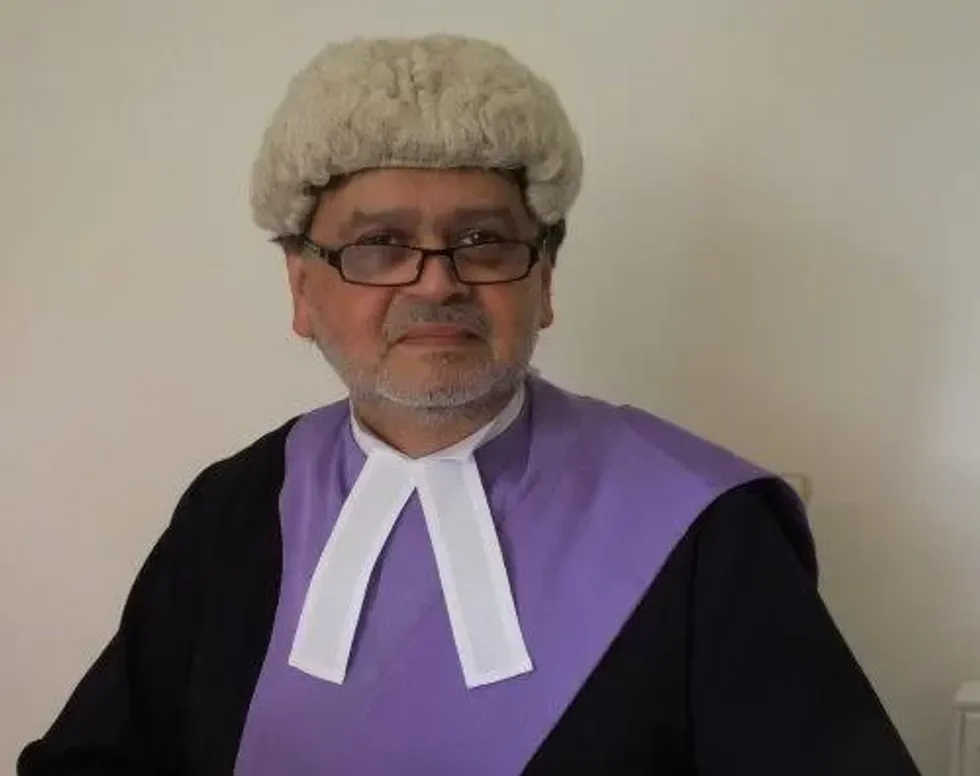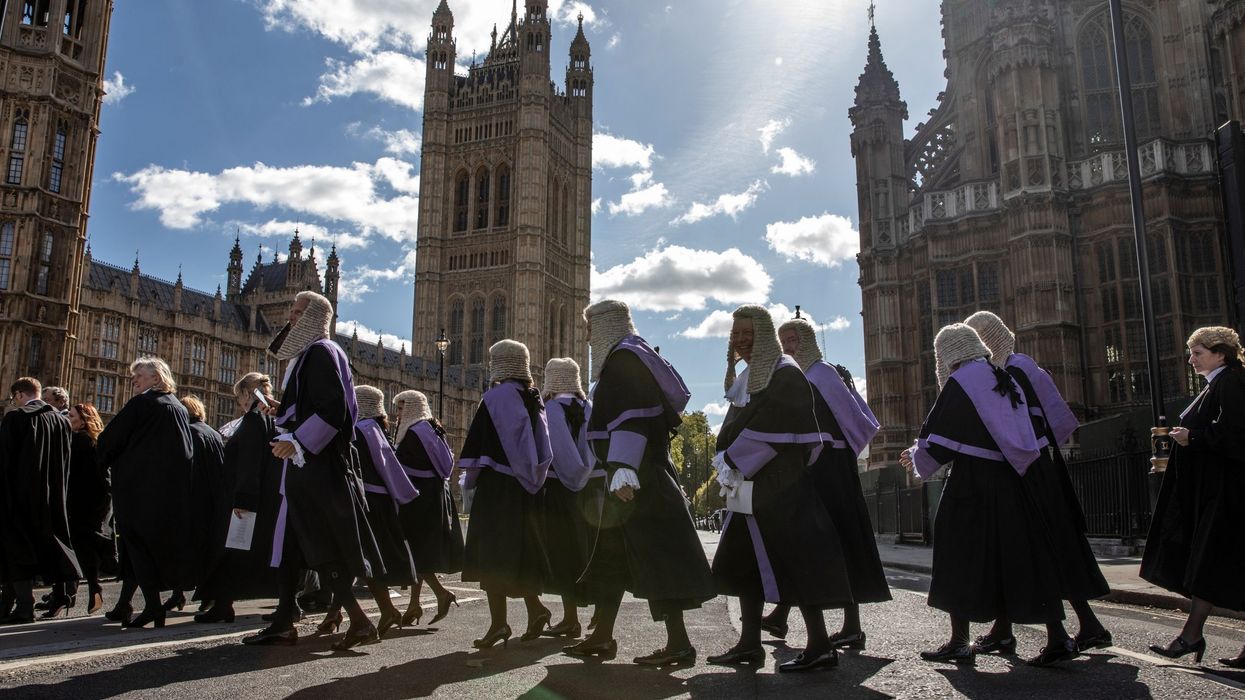THE body which appoints judges and one of its senior leaders lied to avoid giving information to the public, a tribunal has heard.
Judge Abbas Mithani KC is taking legal action against the Judicial Appointments Commission [JAC] and Information Commissioner’s Office [ICO] because they did not give him full disclosure to three freedom of information requests [FOI] he made.
The JAC told the General Regulatory Chamber in Leicester that the judge’s allegations were “very serious”, but “rejected in their entirety”.
In his 90-minute closing statement, Mithani criticised the JAC, its former head of corporate affairs, Ian Thomson, who oversaw the FOI requests, and the government legal department [GLD].
“I have found the evidence of Mr Thomson not only inaccurate, but untruthful,” he said.
“The JAC legal team has fallen substantially short of what is expected from professional lawyers.
“I will demonstrate that it is simply not the case that the evidence on which they rely, it being their burden, meets up to the standards of discharging their burden of proof, being on the balance of probabilities.”
He continued that the JAC had “frankly told untruths” when it came to applying section 36 of the act, one of its exemptions.
This requires a so-called qualified person approved by a justice minister.
That person, the court was told, must provide an opinion which shows that releasing the information would “prejudice public affairs”, and that their view was reasonable.
“My written submission contains a detailed chronology of serious and serial failings at the JAC in relation to the application of this exemption,” said Mithani.
“I believe it to be undisputed, but I’m still not clear about the JAC’s position.
“They knew there was no valid authorisation in place.
“I think that has to be admitted at the time when my FOIs were made and when they were refused and subsequently when the information commissioner made his decision.”
The hearing was technical and detailed and both sides took the panel through reams of court documents.
Economical with the truth
Mithani focused on a letter from Steven Ball, who worked under Thomson at the JAC.
He argued that Ball gave a clear impression in a letter to the ICO that the commission was authorised to use section 36 when it did not.
“He never mentioned there was no authorisation,” said the judge. “At that stage the JAC had no authorisation at all.
“Here is a member of staff, under the supervision of Mr Thomson, who is representing to the information commissioner that there is authorisation in place.
“Perhaps the tribunal might consider that at the time when he made this statement, although Mr Thomson knew there was no authorisation in place, Mr Ball did not.
“Well, that’s manifestly incorrect.”

At this point, Mithani introduced evidence obtained by Eastern Eye – a series of emails made public because of freedom of information requests.
He said, “Mr Ball is copied in the email dated 27th July 2022, so going back to what Mr Ball was saying on the 3rd of October 2022, it just was not true.
“There is no other explanation for it...Mr Thomson and Mr Ball were all in it together…basically economical with the truth.
“‘Why should we tell the information commissioner we don’t have any authorisation?
“‘No-one’s going to enquire about it, we can just let it slip,’” he said.
The judge, who was appointed by the master of rolls in his current role in August 2019, criticised the ICO for not taking part in the proceedings because “it doesn’t have the resources”.
The ICO had the “misconceived impression” that the then chief executive of the JAC, Richard Jarvis, was the qualified person, the tribunal heard.
Both the ICO and JAC also wrongly applied the public interest test, where organisations must decide between disclosing or not disclosing information.
“The JAC and information commissioner failed to take into account several matters in relation to the public interest test.
“First, the widespread criticism of the JAC and the substantial body of public opinion that it is not fit for purpose.”
Mithani said this was evidenced by two examples.
“First of all, the submission to the Equality and Human Rights Commission by the Judicial Support Network.
“The other which encapsulates a number of the previous articles and literature on the subject is Professor Barnie Choudhury’s recent article in Eastern Eye about how bad the JAC is.”
Machiavellian JAC
He accused the JAC of being unethical.
“It’s very Machiavellian, a means to an end.
“You decide you’re not going to do something, and then you work backwards, that’s what the JAC is doing, working backwards, and it is completely unacceptable.”
Mithani also said the JAC had wronged him by claiming he would “hack” accounts to “target, cause mischief or embarrass people”.
He hinted to the court that he may take legal action against the JAC and Ball for defamation.
“What Mr Ball says is that I have great investigative techniques that would make it possible to hack into other people’s accounts and get information.
“Whose accounts? Because I don’t know who the candidates were to enable me to hack into anyone’s accounts.
“Yes, I could hack into a judge’s account if somebody taught me to do that, and one of my colleagues told me I couldn’t hack a loaf of bread.”
At this point, the judge castigated Ball’s supervisors and the GLD
“What I was accused of was that I knew some of the candidates.
“It is not only disingenuous to suggest to a court through solicitors who have been acting for the JAC, it is absolutely incomprehensible that allegations of this nature are made and that nobody at the GLD bothers to check whether they are correct.”
Mithani also pointed to inconsistencies in approach to decision making when the JAC answered freedom of information requests.

Eastern Eye learnt through FOI requests, sent by Thomson, and published in part last week, that one candidate complained they were unsuccessful “on the grounds of race”.
“Here Mr Thomson is giving information about ethnicity of a candidate, it’s absolutely astonishing.
“Why is my request being dealt with in the way Mr Thomson’s decided to deal with it, when this information was freely given to Professor Choudhury?
“I suggest it’s because it shows something very untoward at the JAC which will expose it to the very many matters that the public has been complaining about.
“That shows the decisions made by the JAC are completely inconsistent.”
Serious allegations
The JAC’s barrister, Natasha Simonsen, concentrated on four main areas.
- Personal data under section 40 of the act.
- The scoring framework.
- Ethnicity and sexual orientation of the candidates.
- Complaints against the JAC.
But as she began her closing argument, Simonsen addressed Mithani’s allegations of her clients’ lying to the tribunal.
“Some very serious allegations have been made, and they are rejected in their entirety,” Simonsen said.
“The allegations are not only against the JAC but also against that JAC’s legal advisers, the GLD and perhaps me as well.
“These are matters we take extremely seriously.
“If the tribunal considered any of that relevant then we would wish to respond in writing to those specific allegations.
“Mr Thomson and his colleagues in the JAC, and my colleagues at the GLD are extremely hard working civil servants who have strived consistently to do the right thing at every stage of the proceedings.
“There is absolutely no desire to cover things up or suppress information.
“What there is is a concern to protect personal information, including sensitive or special category information for both applicants of judicial office and panel members.
“There is also a concern to ensure the appointments system is not prejudiced by disclosure of scoring frameworks which may be unable to be reused in subsequent exercises.”
Personal information
The barrister conceded that the JAC had mistakenly refused one FOI request, but that it corrected the error during the court hearing.
But she said her clients maintained the position that they were right to refuse disclosing certain information to Mithani.
One FOI request was for candidates for senior judges in three circuit areas.
“This (is) personal data because it is a very small number,” argued Simonson.
“Disclosing the number of candidates interviewed would allow individuals together with other information which is reasonably accessible to them – essentially to put two and two together – to work out who was interviewed for that role.
“There is no suggestion that Mr Mithani or anyone else is going to hack anybody.
“We say it’s a small number, a senior position, it’s in a limited geographical area.
“People who are likely to be in the running for those positions may be familiar with the appointments process, they may be familiar with the people.
“If we disclose the number interviewed, that would (cause) all those individuals to be identified.”

Simonsen accepted that anonymised data was not personal data.
But she cited case law to question whether the information was sufficiently unidentifiable.
This was about confidential personal information, and by revealing the candidates scores under freedom of information requests reveal their number.
“The Freedom of Information Act says you can’t get the same data by another means [sic].
“You can’t get across the same exemption in the DPA [Data Protection Act], by exercising rights under FOIA.”
The JAC, she said, could not reveal information without “lawful authority”.
“We say that the number of candidates who were interviewed and their scores is [sic] personal data because it allows individuals to be identified if put together with other information.
“If that is right it cannot be disclosed whether because disclosure would contravene the data protection principles or in respect of that [sic] scores.
“Candidates cannot access that information, so somebody else shouldn’t be able to access it either.”
No discrepancies
Simonson also dismissed the information in the FOI requests obtained by Eastern Eye.
She argued that what was given in written evidence and heard by the tribunal were consistent because of assumptions made by the JAC that Jarvis was the qualified person, because he was the chief executive.
“We’ve applied the request, the information commissioner never raised objections, it must be the case that Dr Jarvis is the qualified person,” the barrister interpreted the emails as meaning.
“Please can you assist me?” she continued, “I’m seeking clarification here.
“That’s what the email said, there’s no suggestion that Mr Thomson is lying or the JAC is being dishonest.
“There’s certainly not an email here that says, ‘Oh gosh we’ve realised we’ve got no authorisation, we’ve been wrongly invoking it, we’ve made a huge mistake.’
“On the contrary, the assumption is there is some sort of record, they’re trying to find it.”
On the mistake made by Thomson in March 2021, Simonson explained that he said in his sworn testimony that “it did not cross his mind” to let the ICO know they could not find the authority naming Jarvis as the qualified person.
“It was absolutely nothing to suggest that was done in bad faith, there is simply no basis whatsoever to suggest that Mr Thomson was lying.
“It was refused categorically and further it was distressing to him and the hard working civil servants at the JAC to be accused in that way.”
The panel has reserved its decision for a later date.




